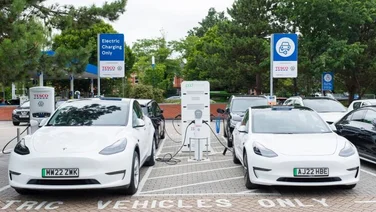The Office of Gas and Electricity Markets – more commonly known as Ofgem – has announced that it will offer up to £450 million to UK businesses and academics through its Strategic Innovation Fund (SIF).
The goals? Reducing the UK’s overall emissions by unlocking greener ways to travel, harnessing more eco-friendly ways to heat and power buildings, and developing a new approach to energy network innovation.
The organisation claims this initiative will “keep bills as low as possible, drive the UK towards its goal of net-zero greenhouse gas emissions by 2050, and help turn the UK into the ‘Silicon Valley’ of energy”.
“The Strategic Innovation Fund will ensure the best projects and most talented minds have the grants available to reduce carbon emissions and enable bill payers to see the benefits of building back greener.” – Energy Minister, Lord Callanan
But who is eligible for the SIF? What kind of projects will the lump sum support? How exactly can you apply for the fund? We’ll guide you through everything you need to know about the new scheme below.

What’s on this page?
What is the Strategic Innovation Fund?
Let’s start with the basics. Over the next five years, £450 million – £90 million a year – will be provided to various UK businesses and academics through the Strategic Innovation Fund.
Ofgem has stated that the total sum of money might increase over time, depending on whether the public shows enough interest.
Approved by Ofgem and managed in partnership with Innovate UK, the fund will tie in neatly with the UK’s wider ambitions to slash 68% of emissions by 2030, and 78% by 2035.
How will it work?
Ofgem suggests that the fund will enable network companies, system operators, and the world’s leading businesses and researchers to work together to drive big ideas, which will speed up the UK’s journey to a greener energy system.
Projects will be funded in three stages – discovery, alpha, and beta – to make sure they run smoothly. The initial competition, which opened in August 2021, is currently in the discovery phase of the first round of the SIF.
Innovation UK has stated that projects will be monitored and supported, and – if they need it – will be assisted in upscaling. If a project needs help expanding, a network of investors and utilities will coach the businesses involved and develop ways to market their ideas both nationally and internationally.
When does it start?
Good news – applications for the Strategic Innovation Fund have already started. As of 31st August 2021, anyone eligible can apply for the fund.
Who’s eligible for the fund?
Network companies, system operators, and leading businesses and researchers can all apply for funding – provided their project is targeted at one of the following challenges:
- Whole system integration (the entire journey of electricity, from power plants to home usage)
- Data and digitalisation
- Heating
- Zero-emission transport
The fund is set to launch more challenges in the future, but for now, it will focus on reducing emissions through these points alone.
Projects could include anything from the rollout of clean heating solutions, to the development of new battery technologies.
Ofgem states that “ideas need to be big, bold, and ambitious, with the potential to scale across the networks upon completion”.
If your business has any projects in the pipeline that could fall under these categories, what are you waiting for? Apply to get the funding.

How can businesses apply for the SIF?
You can find the application forms on the government’s ‘innovation competitions’ website. Bear in mind that you’ll have to fill out a different form depending on which challenge your project focuses on.
According to Ofgem’s statement, to be part of the Strategic Innovation Fund, companies first need to form partnerships within the gas and electricity network and with system operators. Together, this alliance can then apply for funding through a competitive process.
Innovation UK states that bidders need to fill in a 10-question application, with at least 400 words per answer. You’ll also need to provide a 60-second video, as well as additional information that can help Ofgem and Innovation UK communicate the projects externally.
As part of the application, you’ll also be asked for early thoughts on investment readiness and any possible barriers.
How will the fund help businesses?
The SIF is an opportunity for both businesses and academics to work with energy networks on various green projects. Overall, the funding can help businesses:
- Save consumers money
- Reduce emissions
- Improve access to energy markets
- Develop new products, processes, or services
Running a project that directly helps the environment is also likely to make a company more attractive to current and future employees.
A PricewaterhouseCoopers study reported that 88% of millennials prefer companies that emphasise corporate social responsibility.
But it’s not just millennials that are prioritising morality in the workplace. In a 2020 survey, Reuters reported that almost two-thirds (65%) of respondents said that they were more likely to work for a company with strong environmental policies.
So, taking part in a significant environmental scheme like this is likely to boost your business’s environmental credentials, putting you ahead of the third of UK firms with CO2 emissions that are contributing to the climate crisis.
What impact will the SIF have on the environment?
In 2019, total UK greenhouse gas emissions were 45% lower than in 1990, proving that we can, in fact, cut down emissions rapidly.
Between 2008 and 2018, the following industries cut down the most emissions:
- Energy sector – a 62% fall in emissions, thanks to the UK abandoning coal
- Waste sector – a 46% fall in emissions, after capturing methane emissions
- Industry – a 29% fall in emissions, as overall efficiency was improved
Despite the drop in emissions, these sectors still remain some of the highest polluters in the UK. By targeting the main culprits, it’s hoped that the SIF will make a significant difference in emissions over the next five years.
However, there are also other industries that need urgent support in cutting emissions. As you can see on the graph below, the agricultural industry is still pumping out greenhouse gases rapidly – between 2008 and 2018, it had only reduced its overall emissions by 2%.
Data from Statista, 2019
So, whilst the Strategic Innovation Fund will undoubtedly have a positive impact on the environment, it will need to expand its projects to other sectors in order to really make a lasting impact.
Summary
If successful, the Strategic Innovation Fund will encourage sectors to continue reducing emissions over the next five years.
Think your business is capable of putting forward a successful project idea? Apply for a spot in the competition. You can improve your business’s eco-credentials, help the environment, and support the UK in reaching its net-zero goal.






